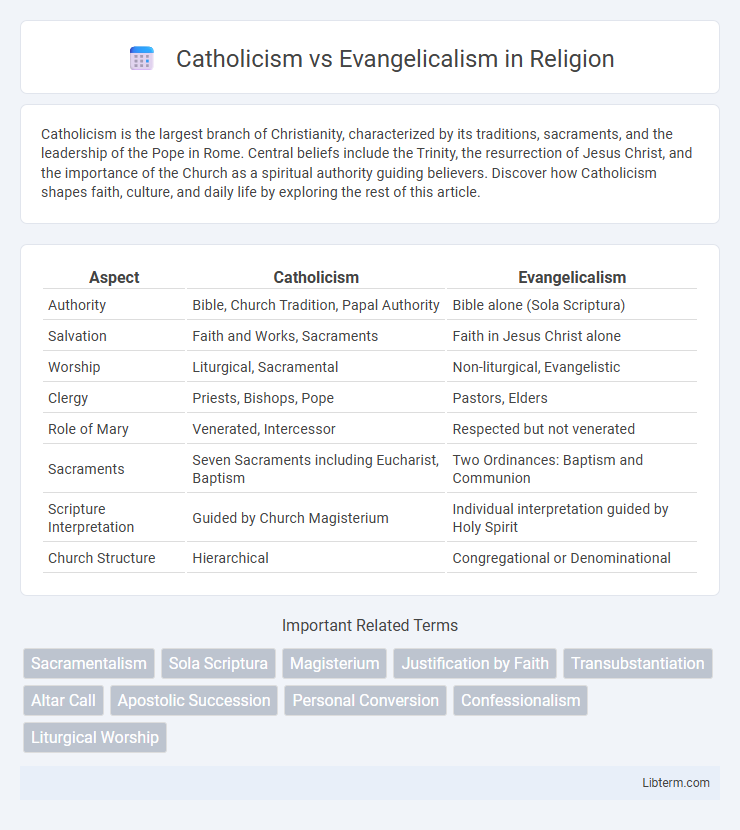Catholicism is the largest branch of Christianity, characterized by its traditions, sacraments, and the leadership of the Pope in Rome. Central beliefs include the Trinity, the resurrection of Jesus Christ, and the importance of the Church as a spiritual authority guiding believers. Discover how Catholicism shapes faith, culture, and daily life by exploring the rest of this article.
Table of Comparison
| Aspect | Catholicism | Evangelicalism |
|---|---|---|
| Authority | Bible, Church Tradition, Papal Authority | Bible alone (Sola Scriptura) |
| Salvation | Faith and Works, Sacraments | Faith in Jesus Christ alone |
| Worship | Liturgical, Sacramental | Non-liturgical, Evangelistic |
| Clergy | Priests, Bishops, Pope | Pastors, Elders |
| Role of Mary | Venerated, Intercessor | Respected but not venerated |
| Sacraments | Seven Sacraments including Eucharist, Baptism | Two Ordinances: Baptism and Communion |
| Scripture Interpretation | Guided by Church Magisterium | Individual interpretation guided by Holy Spirit |
| Church Structure | Hierarchical | Congregational or Denominational |
Historical Roots of Catholicism and Evangelicalism
Catholicism traces its historical roots to the early Christian communities established by the apostles, particularly Peter, regarded as the first pope, shaping a continuous tradition from the 1st century AD centered on the Roman Church. Evangelicalism emerged in the 18th century during the Protestant Reformation and the Great Awakening, emphasizing personal faith, scriptural authority, and conversion experiences distinct from Catholic sacramental practices. The foundational divergence lies in Catholicism's hierarchical structure and sacramental theology contrasted with Evangelicalism's focus on individual salvation and biblical literalism.
Core Doctrinal Differences
Catholicism emphasizes the authority of the Pope, tradition, and the seven sacraments as essential components of salvation, while Evangelicalism centers on the authority of Scripture alone (sola scriptura) and salvation through faith in Jesus Christ. The Catholic doctrine upholds transubstantiation in the Eucharist, asserting Christ's real presence, whereas Evangelicals typically view Communion as symbolic. Moreover, Catholics venerate saints and Mary, believing in their intercessory role, whereas Evangelicals reject this practice, emphasizing a direct relationship with God through prayer.
Views on Scripture and Tradition
Catholicism holds Scripture and Tradition as equally authoritative, with the Magisterium interpreting both to guide faith and practice, emphasizing teachings rooted in early Church councils and apostolic succession. Evangelicalism prioritizes sola scriptura, asserting the Bible as the sole infallible authority, often rejecting traditions not explicitly grounded in Scripture. This divergence influences liturgy, doctrine, and the role of church authority within each tradition.
The Role of the Church and Authority
Catholicism emphasizes the Church as the authoritative institution guided by the Pope and the Magisterium, maintaining apostolic tradition and sacraments as essential to faith and practice. Evangelicalism prioritizes personal Bible interpretation and a direct relationship with God, often valuing congregational autonomy over centralized ecclesiastical authority. This divergence shapes differences in worship, doctrine, and governance between the two Christian traditions.
Salvation: Faith, Works, and Grace
Catholicism teaches that salvation is a process involving faith, grace, and works, emphasizing the importance of sacraments and living a virtuous life in cooperation with God's grace. Evangelicalism emphasizes salvation by faith alone (sola fide), asserting that grace is a free gift from God received through personal faith in Jesus Christ, independent of works or human merit. Both traditions acknowledge grace as essential but differ on the role of works, with Catholicism viewing them as integral to maintaining salvation, while Evangelicalism regards works as evidence of genuine faith.
Sacraments and Ritual Practices
Catholicism emphasizes seven sacraments, including Baptism, Eucharist, and Confirmation, viewed as essential channels of divine grace instituted by Christ. Evangelicalism recognizes two ordinances, Baptism and the Lord's Supper, as symbolic acts of faith rather than means of grace. Ritual practices in Catholicism involve liturgical ceremonies and the veneration of saints, while Evangelical worship tends to prioritize preaching, personal conversion, and bible study over traditional sacraments.
Worship Styles and Liturgy
Catholic worship centers on the Eucharist as the liturgical high point, featuring structured rituals, formal prayers, and sacred symbols within Mass, guided by a hierarchical clergy. Evangelical worship emphasizes spontaneous, emotive expressions including contemporary music, extemporaneous prayer, and preaching focused on personal conversion and biblical teaching, typically within less formal settings. The Catholic liturgy follows a fixed ritual calendar and sacramental theology, while Evangelical services prioritize direct engagement with scripture and individual faith experience.
The Role of Mary and the Saints
Catholicism emphasizes the veneration of Mary as the Mother of God, highlighting her Immaculate Conception and Assumption, while Evangelicalism generally views Mary as a respected figure but rejects doctrines conferring her divine status. Catholics invoke the intercession of saints, believing they act as mediators and examples of holy living, whereas Evangelicals emphasize a direct relationship with God through Jesus Christ, often rejecting saintly intercession as unbiblical. The theological divergence over Mary and the saints reflects broader differences in authority, tradition, and scriptural interpretation between the two Christian expressions.
Evangelism and Mission Approaches
Evangelicalism emphasizes personal conversion, biblical authority, and active evangelism through grassroots outreach, street preaching, and church planting to spread the Gospel rapidly. Catholicism approaches evangelism with a sacramental and liturgical focus, often integrating social justice initiatives and educational missions within established parish communities. Both traditions prioritize global missionary work but differ in methodology, with Evangelicals favoring direct proclamation and Catholics emphasizing communal worship and catechesis.
Global Influence and Modern Challenges
Catholicism, with over 1.3 billion adherents worldwide, maintains significant global influence through its extensive network of dioceses and its role in international diplomacy via the Vatican. Evangelicalism, rapidly growing especially in Latin America, Africa, and Asia, leverages contemporary media and grassroots activism to expand its reach and cultural impact. Both face modern challenges such as secularization, internal reform debates, and navigating sociopolitical tensions in diverse global contexts.
Catholicism Infographic

 libterm.com
libterm.com